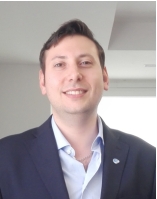Title:Scattering-based processing of polSAR data for ocean applications
Speaker:Prof. Andrea Buono
Affiliation:Dipartimento di Ingegneria, Università degli Studi di Napoli Parthenopy
Abstract:Synthetic aperture radar imagery collected by satellite and aircraft platform has been shown to be a key information source for a plenty of environmental monitoring domains including land, cryosphere, urban and oceans. Nowadays, the synthetic aperture radar data accessibility for research purposes is also increasing fast, boosting worldwide the exploitation of such valuable information source. Nonetheless, the available synthetic aperture radar imagery is collected under frequencies, i. e., L-, C- and X-band, imaging modes, i. e., ScanSAR, StripMap, Spotlight, and polarimetric configurations, i. e., dual-, compact- and full-polarization ones, thus making crucial the more suitable data selection for the specific application. In addition, this large amount of synthetic aperture radar measurements well matches with the high potential shown by artificial intelligence-based methods, including traditional machine learning approaches and the more recent deep learning techniques, in dealing with big data. However, to avoid the risk of a “black-box” approach, it is important to feed artificial intelligence techniques with the scattering information, thus guaranteeing a physically-informed processing which is tailored for the specific application, being therefore more reliable and robust.
Within this context, this tutorial aims at training PhD students and early-stage career researchers who already have basics knowledge of synthetic aperture radar imaging and would learn how to develop added-value products that are based on the scattering information. This tutorial is meant to be practice-oriented to let the attendees apply in real time theorical concepts on actual synthetic aperture radar measurements collected in polarimetric modes. The participants will learn how to browse Sentinel-1 C-band synthetic aperture radar imagery from the new open access (registration is needed) Copernicus Data Space Ecosystem provided by the European Space Agency and how to select data (imaging mode, polarization, product level) depending on the targeted application. Then, during the tutorial, the attendees will learn how to pre-process synthetic aperture radar data (including calibration, speckle filtering, geocoding) using the open access and user-friendly Sentinel Application Platform which is made freely available from the European Space Agency upon registration. Finally, selected ocean applications will be showcased for which tailored scattering-based synthetic aperture radar data processing will be provided. Note that how to develop added-value products from pre-processed synthetic aperture radar data will be described using Matlab code, even though participants who are more familiar with other programming languages as Python, IDL, C++, etc. could easily reproduce the Matlab code presented during the tutorial.
Biograph:

Andrea Buono was born in Naples, Italy, in 1984. He received the B.Sc. and M.Sc. Degrees in Telecommunication Engineering and the Ph.D. in Information Engineering from the Università degli Studi di Napoli Parthenope, Naples, Italy, in 2010, 2013 and 2017, respectively. Since 2018, he has been Assistant Professor in Applied Electromagnetics at the Engineering Department of the Università degli Studi di Napoli Parthenope. In 2021 he received the Italian National Scientific Qualification for Associate Professorship.
He is actually an IEEE Senior Member and part of the Editorial board for the international peer-reviewed scientific journals IEEE Geoscience and Remote Sensing Letters (Associate Editor) and MDPI Remote Sensing (Guest Editor).
Since 2014 he is involved in the framework of the joint “Dragon” cooperation project between the European Space Agency and the National Remote Sensing Center of China, first as a Young Scientist (Dragon 3) and, then, as a Co-principal Investigator (Dragon 4 - 6).
He was invited as keynote speaker at the 2023 IEEE International Workshop on Metrology for the Sea (La Valletta, Malta). He was also invited to have a tutorial at the 2023 IET Radar Conference (Chongqing, China), the 2019 SERFA Conference (Sorocaba, Brazil), the 2019 IEEE Oceans Conference (Marseille, France), and the 2017 Brazilian Symposium of Remote Sensing (Santos, Brazil).
His research activities deal with the development of microwave electromagnetic models mainly focused on
the characterization of complex surfaces and scenarios and on the interpretation and exploitation of polarimetric information. These theoretical studies found their applications in environmental remote sensing mainly regarding the observation of the ocean and coastal areas using multi-frequency/polarization synthetic aperture radar. In this context, he developed novel scattering-based approaches that lie at the basis of several added-value products, including coastline extraction, natural and man-made target detection and classification, sea wind and wave mapping and marine pollution monitoring.
He is author/co-author of more than 115 works among publications on international peer-reviewed journals, refereed proceedings presented at international conferences and book chapters.